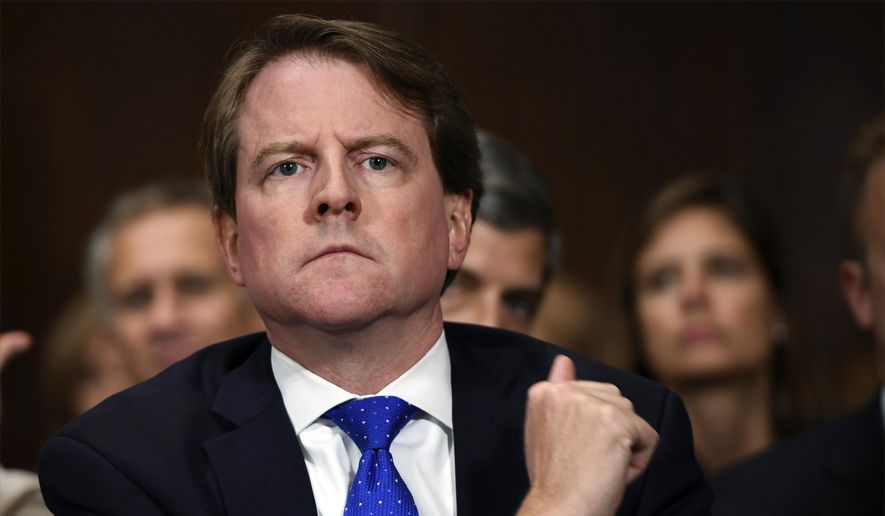Lawyers for the Justice Department on Thursday urged a federal judge to declare former White House counsel Donald McGahn and other top presidential advisers absolutely immune from congressional subpoenas.
“Congress cannot circumvent a constitutional bar on subpoenaing the president by subpoenaing his closest aides,” said James Burnham, a Justice Department who is representing Mr. McGahn.
House Democrats filed a lawsuit earlier this year asking a federal judge to force Mr. McGahn to testify, arguing it has harmed their efforts to investigate President Trump.
The case is one of the most critical legal battles between the Trump administration and Congress because it could have significant implications for the authority of both branches. Administrations of both parties have invoked the concept of “immunity” to block top aides from appearing before Congress, but those claims have largely been untested before a federal court.
Democrats on the House Judiciary Committee have pushed the issue, filing a lawsuit against Mr. McGahn in August, claiming that his testimony is critical to the impeachment inquiry.
Democrats are probing whether the president pressured Ukraine’s leaders to investigate former Vice President Joseph R. Biden and at others matters that they say Mr. McGahn could discuss.
“The injury that [the committee] suffers is not only to the impeachment investigations but to its oversight and legislative priorities including oversight of the FBI and DOJ,” Megan Barbero, a lawyer for the House Judiciary Committee, said Thursday.
Another attorney for the Democrats, Douglas Letter, said the administration’s claim of absolute immunity is not on solid legal ground. “This is what they wish the law were, but it is not what it is,” he said.
Judge Brown expressed skepticism that the White House could block former officials from talking to Congress.
“We don’t live in a world where your status as a former executive branch official somehow shields you or prevents you from giving information,” she said.
The judge said former executive branch officials appear on television “almost every day” offering information to the media. She wondered if an absolute immunity tag would apply to Mr. McGahn for the rest of his life.
Mr. Burnham countered that the absolute immunity claim would only apply to Mr. McGahn’s direct work for the president.
Attorneys for the Democrats said Mr. McGahn witnessed several events that could shed light on whether the president obstructed justice, a possible impeachable offense.
Mr. McGahn was involved in Mr. Trump’s removal of former National Security Adviser Michael Flynn and ex-FBI Director James B. Comey. He also was told by Mr. Trump to pressure former Deputy Attorney General Rod Rosenstein to fire then-special counsel Robert Mueller for alleged conflicts of interest.
In a span of interviews with Mr. Mueller’s team, Mr. McGahn said the president pressed him to fire the special counsel, which became one of the 10 episodes of possible obstruction detailed in the Mueller report. Attorney General William Barr ultimately concluded Mr. Trump did not obstruct justice.
• Jeff Mordock can be reached at jmordock@washingtontimes.com.




Please read our comment policy before commenting.